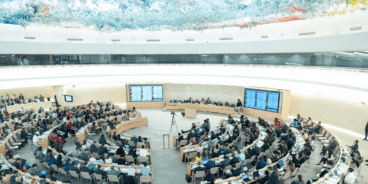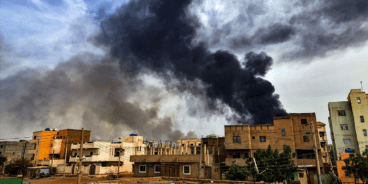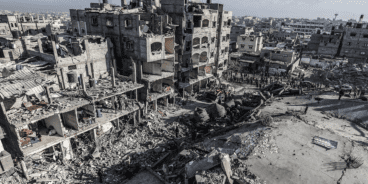
Statement by the Global Centre for the Responsibility to Protect at the Human Rights Council Side-Event on the Responsibility to Protect
Statement delivered by Naomi Kikoler, on behalf of the Global Centre for the Responsibility to Protect, on 19 June 2012 in Geneva
Chair,
Thank you for this opportunity to present a statement on behalf of the Global Centre for the Responsibility to Protect.
Thank you as well to the sponsors of this event, Australia, Hungary, Nigeria, Thailand and Uruguay for convening this timely discussion on the role of the Human Rights Council in the implementation of pillar 1 and pillar 2 of the Responsibility to Protect.
It is worth underscoring that at the core of the Responsibility to Protect (or R2P) lies the responsibility to prevent. Sixty-seven years after the liberation of Auschwitz prevention remains the least understood aspect of the Responsibility to Protect. Domestic, regional and international actors continue to respond too little and too late to the risk of mass atrocity crimes.
We know that prevention can work. In Guinea, sustained and coordinated engagement by local, regional and international actors using a range of measures that included meditation and targeted sanctions averted mass atrocity crimes and saved lives.
The Human Rights Council, while slow to act following the massacre of civilians in a stadium in Conakry in 2009, did take steps to support preventive efforts in the lead-up to the 2010 elections. In resolutions 13/21 and 16/36, Human Rights Council members recalled that it was the primary responsibility of Guinea to protect its population; condemned the commission of crimes; commended the efforts of the mediators; encouraged the government to take steps to fulfill its responsibilities; called upon the international community to support the government in its efforts; and supported the opening of an Office of the High Commissioner for Human Rights country- office to monitor human rights in Guinea.
This is a positive example of how the Human Rights Council can help prevent mass atrocity crimes through emphasizing the implementation of pillar 1 (the states’ responsibility to protect) and pillar 2 (the international community’s commitment to assist states in their efforts).
Unfortunately successful preventive cases such as Guinea are far too rare. We believe that the Human Rights Council has a critical role to play in rectifying this failure.
The Human Rights Council can do so through three core functions:
- Providing early warning of the risk of mass atrocity crimes.
- Urging states to take preventive action in accordance with their Responsibility to Protect.
- Employing tools at the Human Rights Council’s disposal such as issuing resolutions andmandating the creation of Commission of Inquiries to document and investigate allegations of mass atrocity crimes.
Complementing the efforts of the UN General Assembly and Security Council, the Human Rights Council provides a unique forum for the development of guidance and the sharing of best practices on how states can uphold their Responsibility to Protect.
As part of the guidance to states, we would encourage the Human Rights Council to urge governments to do three things:
- Re-affirm their commitment to R2P.
- Undertake a review of their existing preventive and protective capacities.
- Appoint a senior high-level government official as a national Focal Point for the Responsibility to Protect.
Launched in 2010 and coordinated by the Governments of Australia, Costa Rica, Denmark and Ghana, with support from the Global Centre for Responsibility to Protect, Focal Points are responsible for the promotion of R2P at the national level and will work to support international cooperation on the issue through participating in a global network. Their appointment is an important step that governments can take to improve intra-governmental and inter-governmental efforts to prevent and halt mass atrocity crimes.
Over 30 governments representing every region/continent participated in the first meeting of Focal Points held in May 2011. Since then, support for the initiative has continued to grow. Most recently the Economic Community of West African States (ECOWAS) issued a Communique calling upon member states to appoint Focal Points following a regional forum jointly hosted by the Global Centre for the Responsibility to Protect and ECOWAS.
Sixty-seven years after the liberation of Auschwitz we are finally beginning to craft an international mass atrocity prevention agenda. The appointment of Focal Points is a key component of that agenda and an initiative that we encourage the Human Rights Council to advance and member states to embrace.
Related Content


Atrocity Alert No. 390: Sudan, Myanmar (Burma) and the UN Human Rights Council
